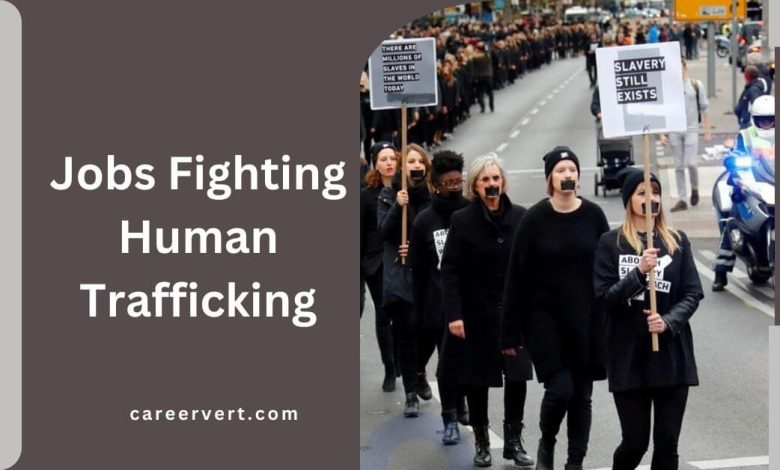Job Fighting Human Trafficking – How to Get

Human trafficking is a tragic societal pandemic that has a global impact. What is even more alarming is that human traffickers assume the identities of recruiters, romantic companions, or travel agents.
Numerous individuals are committed to establishing their vocations by permanently ending this atrocity.
Nevertheless, it is frequently challenging to secure employment in an anti-human trafficking capacity. This article will assist you in obtaining employment in the field of human exploitation by offering indispensable advice. Continue reading to discover the answer.
Check Also: Visa Sponsorship Agencies Offering Jobs in USA – Apply Now
What Do Anti Human Traffickers Do
A human trafficking advocate investigates a human rights violation or the case of a victim of exploitation. As a human trafficking advocate, you assist victims by collaborating with government outreach efforts and working with non-profit organizations, and legal organizations. Other responsibilities include assisting victims in procuring assistance and traveling to various regions where human trafficking is a problem.
Another method of engaging the public is to advocate against human trafficking on social media and other platforms. To combat human trafficking, you are also responsible for collaborating with legislators to develop legislation. Assistance to the government may involve conducting door-to-door campaigns to distribute flyers that raise awareness of human trafficking, publically petitioning, or working in capital cities.
What Degrees Are Useful For Fighting Human Trafficking
1. Political Science
If you are involved in the writing and dissemination of numerous petitions against human trafficking, encouraging others to do the same, and participating in contentious debates regarding the issue, your journey to combating human trafficking may commence with a political science degree. This degree will provide you with an understanding of the processes that are employed in the development and enforcement of laws and policies.
2. Criminal Justice
You may be profoundly dedicated to the capture of the perpetrators and the enforcement of the consequences of human trafficking. It is advisable to consider pursuing a degree in criminal justice. This will facilitate your employment in the legal or law enforcement sector. You may earn a livelihood by prosecuting perpetrators, defending victims, or working in a special victims unit of a law enforcement agency.
3. Psychology
The psychological aspects of human trafficking may pique your interest the most. A psychology degree provides access to a diverse array of professions that allow one to make a meaningful contribution to the cause. You may pursue a career as a researcher, investigating the psychological factors that contribute to the development of perpetrators and victims. You may pursue a career as a therapist, dedicating your days to aiding victims in their recovery from the atrocities of their past.
4. Social Work
If you are interested in becoming more involved in the lives of individuals who have been impacted by human trafficking, you may want to consider pursuing a degree in social work. Social workers have a wide range of responsibilities, but a significant number of them pertain to human trafficking.
Social workers are frequently assigned to victims to provide assistance and support as they endeavor to break the cycle of human trafficking and restore their lives.
How to Get a Job Fighting Human Trafficking
1. Contribute your Time
Contributing one’s time is the initial stage in obtaining employment in the field of human trafficking. Volunteering may facilitate the acquisition of a more formal comprehension of human trafficking prevention. According to Forbes individuals can establish a society or community group that combats human trafficking by raising awareness or taking direct action, such as fundraising to support existing trafficking-prevention organizations. Additional initiatives may involve participating in a practicum with an anti-trafficking organization or organizing a conference on human trafficking prevention. Volunteering can offer valuable field experience that can be leveraged for future job opportunities.
2. Get a Pen
An article was published by the United States Department of State, which disclosed 20 ways you can help fight human trafficking. It promotes the engagement of citizens in the process of lobbying government leaders to address the issue of human trafficking.
Lobbying will not only aid in your endeavor to combat human trafficking, but it will also equip you with valuable lobbying and advocacy skills that can be applied to a professional career in anti-trafficking advocacy.
Consider reaching out to representatives at the local, state, national, and international levels to expand the scope of your endeavors. By encouraging others to engage with government officials on behalf of human trafficking victims, you can integrate volunteer and lobbying endeavors.
3. Meet & Greet
Human trafficking can cultivate strong relationships between individuals and organizations that are working toward a shared objective due to the fact that it frequently elicits profound emotive responses in individuals. Gain a deeper understanding of the issue and broaden your professional network by establishing connections with advocates, attorneys, counselors, and other individuals who are dedicated to the prevention of human trafficking. As you construct a curriculum vitae that integrates academic pursuits, volunteer work, and other initiatives, individuals in your network may eventually employ you to assist in their endeavors.
4. You Need to Apply
Do not anticipate that employers will flock to you, even though networking can assist you in locating available employment. Create a curriculum vitae, cover letter, and references to ensure that you are prepared to apply when job opportunities arise.
Your academic education and practical experience assisting anti-trafficking organizations have equipped you with the necessary skills to transition to your next career. You have the option of applying to organizations like the Polaris Project, which promotes the implementation of more stringent anti-trafficking legislation in the United States.
Prajwala, an Indian organization, is dedicated to the prevention of sex trafficking. The Children’s Organisation of Southeast Asia (COSA) endeavors to prevent the enslavement of children, with a particular emphasis on sexual enslavement. In Thailand, organizations like Urban Lightworkers are instrumental in preventing the enslavement of young males.
Benefits of Job Fighting Human Trafficking
- Creating a Positive Social Impact: The opportunity to assist vulnerable individuals in escaping exploitation and enhance their quality of life is provided by the fight against human trafficking. This influence extends to families and communities, resulting in broader societal advantages.
- Job Satisfaction and Purpose: Professionals in this field frequently experience profound personal satisfaction in their role as advocates for social justice and advocates for the recovery of victims. This work can be immensely motivating and rewarding due to the sense of purpose it provides.
- Human trafficking is a global: issue, and there is a growing demand for competent professionals to address it. This has resulted in growth and development in a high-demand field. The demand for anti-trafficking personnel is on the rise, providing stable employment opportunities in a variety of sectors, including law enforcement, social services, and legal support.
- Opportunities for Interdisciplinary Collaboration: The field of anti-trafficking provides individuals with the opportunity to collaborate with professionals from a variety of disciplines, including healthcare, law enforcement, policy, social work, and nonprofits. This multidisciplinary environment fosters the development of a broad professional network and provides a variety of learning opportunities.
- Career Advancement and Specialization: Anti-trafficking professions provide the opportunity to specialize in fields such as victim advocacy, criminal investigation, policy development, rehabilitation, and education. By acquiring expertise in a particular field or transitioning into leadership positions within organizations, professionals can advance their careers.
- Increased Skills and Knowledge: In this field, professionals acquire valuable skills in cultural sensitivity, risk assessment, trauma-informed care, and crisis intervention. These abilities are advantageous in a variety of capacities, including human rights advocacy, law enforcement, and social services.
- Influencing Policy and Legal Reform: The opportunity to advocate for changes that safeguard vulnerable populations and influence policy is provided by anti-trafficking work. Numerous individuals in this field are involved in the development of more stringent laws, the establishment of awareness campaigns, or the provision of training to others to prevent trafficking.
- Global Impact and Perspective: Human trafficking is a global issue, and anti-trafficking efforts can offer a global perspective. Contributing to a more comprehensive comprehension of human rights, certain positions may necessitate international travel or collaboration with organizations worldwide.
- Community Awareness and Education: Public education and outreach are frequently implemented by anti-trafficking professionals to increase awareness, inform communities, and prevent trafficking. This project fosters a cascading effect in society by enabling communities to identify indicators of trafficking and provide assistance to survivors.
- Personal Development and Resilience: The experience of working in challenging situations frequently promotes personal development, resilience, and compassion. Anti-trafficking professionals develop a profound dedication to human rights and become fervent advocates for justice.
Conclusion:
Actively engaging with anti-human trafficking organizations, acquiring relevant skills, and fostering awareness can collectively empower individuals to contribute meaningfully to the fight against human trafficking and help create a safer, more just society.
Frequently Asked Questions:
-
What are the treatments for human trafficking?
Integrated treatment options to alleviate these concerns, including cognitive behavioral therapy, trauma-focused therapy, ecologically focused therapy, and family therapy, are presented. The International Labour Office (2017) has estimated that 40.3 million people are victims of modern-day slavery throughout the world.
-
What is human trafficking?
Humans Against Trafficking is a non-profit whose mission is to prevent human trafficking through the development of software platforms and large-scale social media campaigns that educate and empower people to take action.
-
How to avoid human trafficking while traveling?
You should avoid traveling alone, at night, or on deserted side streets. If you think you are being followed, find a crowded place. Don’t hesitate to alert police to your suspicions, and give friends and family members a description of the potential perpetrator. Volunteer with caution.



